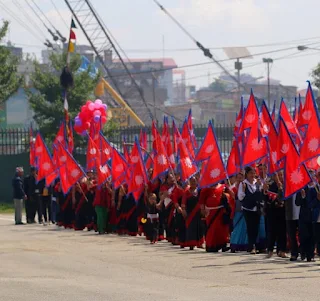Nepal’s Constitution Day - For celebration & to introspect
On September 19, Nepal commemorates Constitution Day with various programs held domestically and internationally. This day sees active participation from federal, provincial, and local governments, political parties and civil society. These diverse groups come together to celebrate and reflect on the significance of the Constitution, which was officially promulgated on September 20, 2015.
Nepal's constitution was the culmination of over seven decades of political struggle, which included a ten-year People's War and widespread civil mobilization. The document, consisting of 35 parts, 308 articles, and 9 schedules, is a milestone in the nation's political evolution. It enshrines key principles such as federalism, inclusive democracy, proportional representation, and secularism, aiming to establish a prosperous nation founded on democratic values and socialism.
Constitution Day is celebrated annually as both Constitution Day and National Day, reaffirming Nepal's commitment to these democratic ideals and marking the success of its long struggle for political inclusion and justice. The day not only to celebrate the achievements of the past but also serves as a reminder of the ongoing effort to build a more just and equitable society under the framework of this historic document.
Nepal continues to grapple with significant challenges in pursuing social justice and a more inclusive society. Despite the progressive nature of the 2015 Constitution, which enshrines principles such as federalism, inclusive democracy, and proportional representation, substantial barriers remain. These barriers are most evident in the enduring structural inequalities linked to caste, ethnicity, gender, and regional disparities. Marginalized groups, including Dalits, indigenous peoples, women, and certain ethnic minorities, remain underrepresented in political, economic, and social spheres, particularly in rural areas where access to resources and opportunities is severely limited.
The country has made notable strides in recognizing and addressing these inequalities through legal reforms and policy initiatives aimed at enhancing inclusion. However, the gap between the formal guarantees of the Constitution and their implementation in practice is still considerable. Persistent economic inequality, limited access to quality education and healthcare, and ongoing gender-based and caste-based discrimination hinder the actualization of a truly equitable society. Additionally, political instability, governance inefficiencies, and the lack of coherent institutional mechanisms for enforcing inclusive policies have further impeded progress toward social justice.
In this context, while the constitutional framework provides a solid foundation for addressing historical injustices and promoting inclusiveness, Nepal faces a long journey ahead in fully realizing the transformative potential of these legal provisions. Sustainable social justice will require comprehensive efforts that not only address legal and policy gaps but also engage in grassroots mobilization and institutional reforms to dismantle deeply entrenched systems of exclusion and discrimination.




Comments
Post a Comment